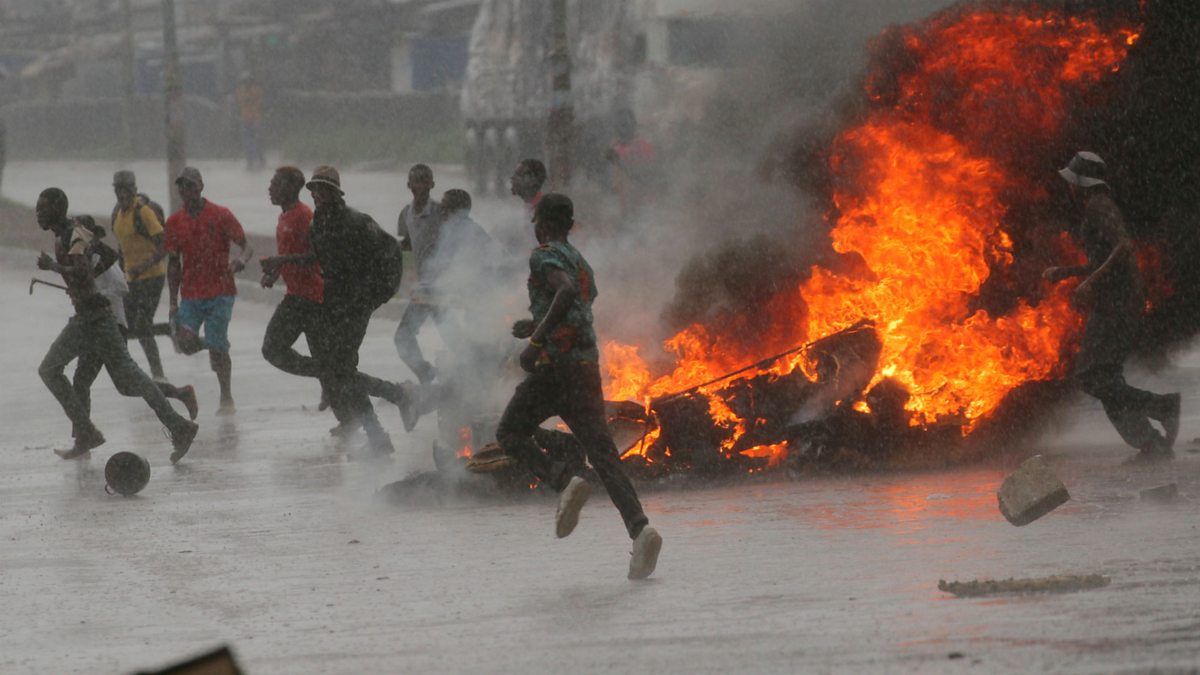Zimbabwean authorities say deaths were recorded in Monday’s protest over hikes in fuel prices. No figure has been given though in relation to the deaths.
In a statement on Monday evening the national security minister, Owen Ncube said the protest “resulted in the loss of life and property including injury to police officers and members of the public.”
“We express our deepest condolences to the bereaved families,” he added in the statement.
The minister also revealed that some arrests have been made in connection with the protests.
Ncube said “our security arms are now firmly on the ground tracking the criminals. They will be apprehended to face the full wrath of the law. In the meantime, security forces have arrested more than 200 individuals who were involved in these disturbances”.
What triggered the protest?
Protests erupted in reaction to hikes in fuel prices announced over the weekend by the government.
President Emmerson Mnangagwa announced new measures to deal with a deepening fuel shortage crisis in the country.
Those measures include a 100% rise in the price of petrol and diesel.
Petrol prices have now increased from $1.24 a litre to $3.31, with diesel up from $1.36 a litre to $3.1.
President Mnangagwa says the increased prices of petrol and diesel are to help tackle a shortfall caused by increased fuel usage and “rampant” illegal trading.
In response to the measures protesters burnt tyres, barricade roads and blocked buses from carrying passengers at some terminals.
It forced many commuters to be stranded for hours. There were reports of some protesters clashing with police with the army intervening to disperse them.
Agitations were intense in Harare and Bulawayo, according to local media reports. There were reports of police officers shooting some of the protesters.
Who is to blame?
Zimbabwe’s national security minister says the “prevailing security situation in the country is a culmination of a well orchestrated series of events by the MDC Alliance working in cahoots with NGOs, civic society, youth organisations, pressure groups and individuals.”
He claims there were meetings organised in Zimbabwe 7 last year aimed at fomenting trouble in the country.
“These meetings were coordinated by Crisis Coalition and some identified foreign agents,” Owen Ncube said.
He adds that “there were other meetings such as the one held on 11th January 2019 in Belvedere, whose agenda was to plan for the disturbance of peace and render the country ungovernable”.
But the opposition has blamed the government for not being up to the task in resolving the economic crisis resulting in agitations.
I’ve met with many on our worsening situation and unbearable suffering.The back-to-school burden,high prices,non-performing economy, joblessness and worthless salaries bring sorrow.On this,I call upon my bro ED to urgent dialogue to solve our politics &economics or it gets worse!
— nelson chamisa (@nelsonchamisa) January 9, 2019
Worsening economic crisis
The Zimbabwean government is already struggling to deal with a currency crisis which has brought the economy onto its kneels.
It now says it intends introducing a new national currency in the coming months.
The country currently uses the U.S. dollar as its national currency but due to ongoing economic issues, the currency has been in short supply.
Zimbabwe has some $10 billion of electronic funds trapped in local bank accounts. It is unable to provide enough hard currency to back that up.
Public sector workers and businesses are also demanding payment in cash and not electronically, compounding the crisis.
Source: Africafeeds.com



